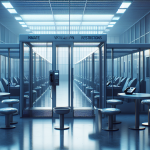Pelican Bay State Prison (PBSP) is one of the largest and most secure prisons in California. It houses thousands of inmates, most of them serving long-term sentences. In order to maintain the safety and security of everyone involved, PBSP has specific rules and guidelines for inmate visitation.
Inmate visitation at PBSP is typically only available on weekends and holidays, during designated visiting hours. Visitors must be 18 years or older and must be pre-approved by registering with the PBSP Inmate Visitation Department at least 48 hours prior to the desired visit. The Inmate Visitation Department also requires that visitors provide a valid government-issued photo ID and pass a background check.
Visitors can bring up to three items to PBSP for their inmate, such as books, magazines, cards, or letters. However, these items must be sent to the Inmate Visitation Department and approved prior to visiting. All food, money, or any other item of value is strictly prohibited.
Visiting hours at PBSP are typically scheduled between 9am and 3pm on weekends and holidays. Each inmate may receive up to two visits per week unless otherwise specified. Additionally, each visitor is only allowed a maximum of four hours per visit, though some inmates may be granted extended visits in certain circumstances.
Inmates and visitors are both subject to search upon entering and leaving PBSP. It is the responsibility of the visitor to leave any prohibited items such as drugs or weapons at home or in their car. PBSP reserves the right to deny or terminate any visit, so it is important that visitors comply with all applicable rules.
PBSP is committed to maintaining the safety and security of its inmates and visitors alike, and its policies for inmate visitation reflect this commitment. By following the guidelines outlined here, visitors can help ensure a safe and orderly visit for their inmate.
Pelican Bay State Prison (PBSP) – Overview and Information
Pelican Bay State Prison (PBSP) is a California maximum-security prison that is located in Crescent City near the border with Oregon. It is one of the two most infamous prisons in California and is known for its purpose as a supermax facility where some of the most dangerous and incorrigible inmates are housed. The other maximum-security prison is Corcoran.
PBSP houses over 4,000 high-security inmates and has a variety of cells that are constructed for different functions such as isolation, long-term, or special-needs housing. The prison also has a death row and a special needs yard for inmates who are medically and psychologically disabled.
PBSP is divided into five different areas: the Security Housing Unit (SHU), Administrative Segregation Unit (ASU), the Reception Center (RC) which is where incoming inmates are processed and housed, the General Population (GP) where inmates reside when they are moved from the other units, and the Corcoran housing unit, which is a separate facility adjacent to PBSP located in Corcoran, California.
Some common rules for inmates are not to possess any weapons, to maintain good behavior and to obey all orders given by the prison staff. Although there is no physical contact between inmates, there is communication between them through mail and phone calls.
The prison has been the center of controversy due to claims of inhumane treatment and solitary confinement for extended periods of time. However, the California Department of Corrections and Rehabilitation has agreed to enact reforms in an attempt to reduce the use of long-term isolation and reduce the risk of suicide and serious mental health issues among inmates.
PBSP is also home to numerous inmates who are serving life sentences. These individuals are constantly monitored and have strict rules to ensure that they maintain good behavior while incarcerated. The goal of the prison is to prepare inmates for successful rehabilitation and release from prison. This is achieved by providing educational and vocational services and offering a variety of programs to the inmates.
PBSP is an important facility for California as it serves as a maximum-security prison and houses some of the most notorious criminals in the state. It is also a part of the prison reform initiatives to reduce inhumane and inappropriate practices. As such, it remains an important part of the overall effort to reduce crime in the state and ensure public safety.
Pelican Bay State Prison (PBSP) – Classes, Services, and Programs
Pelican Bay State Prison (PBSP) is a maximum security prison located in Crescent City, California. It is the only supermax prison in the state and houses some of California’s most violent offenders. Because of the type of inmates who call this prison home, the prison offers a wide range of classes, services, and programs to fit the needs of its inmates.
The educational program at PBSP offers a variety of GED classes and other self-improvement and literacy classes geared toward inmates. These classes focus on improving reading and writing skills, mathematics, and general knowledge. Inmates can also take classes such as woodworking, horticulture, and art.
In terms of services, PBSP has a medical facility with a staff of nurses and doctors. These staff members are there to provide medical evaluations and care to all inmates. The prison also has a mental health facility with counselors, therapists, and psychiatrists to meet the needs of inmates dealing with mental health issues and addictions.
PBSP offers multiple programs designed to improve the lives of its inmates and give them hope for a better future. Inmates can participate in a variety of religious programs and spiritual counseling, which provides the opportunity to strengthen moral values and learn personal responsibility. Additionally, PBSP has a host of programs that deal with employment and self-improvement, such as job training and education classes.
Finally, inmates at PBSP also have the opportunity to participate in a variety of leisure activities. These can include yoga, physical fitness classes, music classes, and art classes. These programs are designed to provide the inmates with positive ways to spend their time and build skills that will help them be successful upon release.
Overall, Pelican Bay State Prison is a unique facility that offers inmates a wide range of classes, services, and programs. These programs are designed to help inmates get through their sentences in a more positive way and also gain the skills and education necessary to succeed upon their release.
Inmate visiting application in Pelican Bay State Prison (PBSP)
Inmates at Pelican Bay State Prison (PBSP) may be allowed to receive visits from family and friends depending on the custody level. Visits can be on-site or virtual. All visits are subject to approval, and visitors must complete an Inmate Visiting Application for approval.
The Inmate Visiting Application must be filled out completely and accurately, and must be approved by PBSP staff. This application must be received at least four weeks prior to the proposed visit date.
Visitors must be 18 or older (unless an underaged visitor is an immediate family member). Visitors must bring a valid photo ID such as a driver’s license or state ID card. Only one adult visitor is allowed at a time (two adults for immediate family members).
Children may visit with an adult sponsor. All children under 18 must bring a birth certificate or other form of picture identification, and must complete a separate Child Visitor form.
Visitors must search their vehicle when arriving the PBSP for any prohibited items. Weapons, drugs, food, or any other objects that might be used as a weapon are strictly prohibited.
The inmate must also submit an approved visiting list. All visitors must appear on the visiting list or their visit will not be allowed. All visitors must sign in at the visiting center before the visit.
Visiting at PBSP is a privilege, not a right. Inappropriate behavior or violations of the PBSP visiting rules may result in removal of the visitor and a ban from future visits.
PBSP staff reserves the right to deny visiting privileges for any reason, including suspected security risk or an inmate’s disciplinary history.
Pelican Bay State Prison (PBSP): Frequently Asked Questions and Answers
Pelican Bay State Prison (PBSP) is a high-security prison located in Crescent City, California. It is the only supermax level prison in the state and the only one of two of the security housing units (SHU) in California. PBSP offers the highest security level for inmates who are deemed the most likely to be involved with serious threatening or violent activity.
Q: What kinds of inmates are housed in PBSP?
A: PBSP houses inmates who require an increased level of security or control due to their violent behavior. PBSP is primarily for long-term inmates, who serve sentences for serious offenses, as well as those inmates with a history of attacking fellow inmates or staff or who are involved in gang activity.
Q: What activities can inmates participate in while in PBSP?
A: PBSP lacks many of the activities typically found in other prisons, due to its high security level. Inmates have limited access to programs such as education, substance abuse treatment, and recreation. They also have access to exercise periods outside of their cells several times a week.
Q: What kind of medical care is available to inmates at PBSP?
A: PBSP provides medical, dental, mental health, and psychiatric care for inmates. Inmates have access to medical and mental health specialists, as well as support staff. All medical staff are certified in the specialized care of high security inmates.
Q: Is there secure communication between inmates and their families?
A: Yes. PBSP has an e-mail system that allows family members to send and receive messages from their loved ones. In addition, inmates are allowed to make phone calls and receive visits from family members.
Q: Does PBSP offer opportunities for rehabilitation?
A: Yes. PBSP offers a range of rehabilitative programs, such as anger management, drug and alcohol treatment, educational classes, and job readiness training. Inmates can participate in these programs either onsite or through vocational training at an outside facility.
Q: When can inmates be released from PBSP?
A: Inmates may be recommended for parole after they have served a certain amount of time, depending on the severity of the crime they committed. The parole board reviews the inmates’ progress and determines if they are suitable for release. If approved, the inmate is released on parole, subject to certain terms and conditions.






